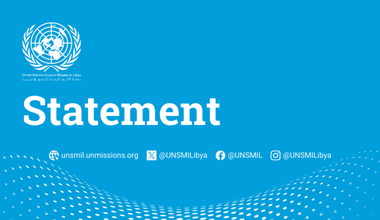Special Representative of the Secretary-General Martin Kobler Statement to the Ministerial Meeting of the Neighbouring States of Libya
“Return to Politics”
Algiers,
Thank you Excellency, Minister Abdelkader Messahel
Mr. Chair, Distinguished Members
At the outset, I would like to once again thank you for inviting the United Nations to participate this important meeting. The role of the neighbouring states remains vitally important for the future of Libya.
While only the Libyans can determine their own future, your support remains crucial. Support which will be more effective when implemented pursuant to a unified position.
Over a year since the Libyan Political Agreement was signed much has been achieved.
Before the signing, Libya was a sharply divided country. The Agreement sought to realize a unified executive and to put an end to parallel institutions. Despite important challenges to its implementation, much has been achieved.
Oil production has reached 760,000 barrels per day, the highest output recorded since 2014.
For the first time for two years, a budget was approved for 2017 and money progressively transferred to the Ministry of Finance.
After recent violence in Tripoli, a ceasefire brokered by the Presidency Council has held for over a month and it is being consolidated through the implementation of a Tripoli Security plan.
These gains are a real achievement. They are however reversible. We should remain cautious.
One and half years after its signing, the Libyan Political Agreement remains the framework and continues to have the support of the vast majority of Libyan stakeholders and of the international community.
We must build on this consensus. Libya cannot afford a political and institutional vacuum.
Such a vacuum would only be used by spoilers and terrorist groups, leading to instability and chaos.
Mr. Chairman,
Despite the progress and despite the consensus on the LPA, negative dynamics continue to be at play to undermine stability.
Despite the increase in oil production, Libya is still running an unhealthy budget deficit. Cost of living is on the rise, a shadow economy now dwarfs the formal economy.
As Ramadan is approaching, life is getting harder for the average Libya. The lines in front of the banks are getting longer. Peoples’ access to basic services is diminishing.
Mr. Chairman,
The liquidity and the currency crisis are becoming a systemic problem, and if not addressed quickly and effectively, the consequences will be serious and affect the country’s economic and financial outlook in the long term.
Advances made in the fight against terrorist groups will be undermined if violence continues in areas such as Jufra and southern Libya. These clashes are unhelpful, they undermine political efforts and they undermine trust and they contribute to the suffering of the Libyan people.
On this point, I would like to emphasize that the political polarisation and military build-up in the south is particularly concerning as it is expanding the conflict and negatively affects an already fragile humanitarian situation.
The pursuit of political goals through the use of violence must stop. It is time to get back to politics.
Mr. Chairman,
The Libyan Political Agreement is not perfect. Limited amendments are needed. These amendments must be done by the Libyans themselves. The UN is only here to facilitate and coorde efforts.
In this regard, I am encouraged by the recent meeting of the President of the House of Representatives President Agila Saleh and the President of the High State Council, Abdulrahman Sweihli.
The meeting between Prime Minister Serraj and Field Marshal Haftar is also a positive sign.
These meetings are important as they signal the willingness of key interlocutors to pursue dialogue and compromise in the highest interest of their people and their country. This dialogue must be encouraged, nurtured and sculpted into action.
Mr. Chairman,
The efforts of neighboring countries have been remarkable.
I would like to take this opportunity to express my sincere appreciation for your recent visits all in all parts Libya.
of
You brought a message of hope and solidarity and encouraged the parties to resolve their differences through dialogue.
Egypt’s continued engagement to build consensus has allowed key stakeholders to further define the areas of the Libyan Political Agremement requiring amendments.
I also wish to commend the initiative of Tunisia to coordinate diplomatic action with Algeria and Egypt and for its continued hospitality of UNSMIL in Tunis.
I am also encouraged by the ongoing dialogue between the United Nations and the AU, LAS and EU within the framework of the Quartet, and I look forward to its next meeting in Brussels on 23 May.
I also look forward to the upcoming visit of the AU High Representative President Jakaya Kikwete to Libya.
Please allow me to suggest six brief points on the way forward: a Roadmap to Peace.
First. The Libyan Political Agreement must remain the framework for a negotiated settlement.
Any amendment to the Agreement must be Libyan led, negotiated in an inclusive manner and those deciding must be committed to and have the ability to implement their decisions.
The appointment of delegations by both the House of Representatives and the High State Council are encouraging steps forward and they should be part of an inclusive process.
Number Two: A process to create a unified security apparatus, a security track, must be reinvigorated.
This requires as a first step that all Libyan Libyan security actors refrain from using violence.
The temperature in Libya must be lowered if the political and discussions are to resume.
There will be no unity through violence.
Field Marshall Haftar willingness to negotiate on the basis of the Libyan Political Agreement is a reason for calculated optimism.
I am also encouraged by efforts of the PC to consolidate control over the armed formations in Tripoli. Tripoli is the capital of the country and the siege of the Presidency Council and the government.
The existence of foreign armed groups in Libya is also a source of instability. I was recently in Sudan and am fully aware of the threats these groups pose not only to Libya but to the region.
These groups must disarm and I encourage Libyan actors to stop the practice of using these groups. This only feeds the violence in Libya and lays the groundwork for instability in neighbouring countries.
I support initiatives aiming at improving border security at Libya’s southern borders. It would bring more stability to Libya and all its neighbours.
Third: The economy and the financial situation of the country needs to be stabilized.
Agreement on a budget framework for 2017 was a significant step forward.
However, budgetary and public finance mechanisms must improve to ensure unified and equitable financing of the services and economy, with funds distributed fairly and transparently to all regions of Libya.
In this regard, I urge for a more constructive cooperation between Libya’s financial and economic institutions and the Presidency Council.
Fourth: National Reconciliation must be integrated decisively at all levels.
The ability of Libyan leaders to mediate local ceasefires is a great asset and has prevented many sparks from creating fires.
Libyans will soon start a comprehensive bottom-up national reconciliation initiative supported by UNSMIL. Here the municipalities will need to play a key role.
Fifth: Public services, security, governance start improving at the local levels.
In a country with a legacy of weak national institutions, local authorities remain among the most respected and effective actors.
We must support them.
Democratically-elected mayors must be given stronger authority, more funds and greater responsibility.
In this context, it is important that international partners are prepared to support the Presidency Council, if requested. Also to deploy expertise on the ground, not only outside, inside Libya and on the ground.
Sixth and last point is particularly important I appeal to you to continue to work collaboratively and make concerted efforts to bring the political and military stakeholders back to the negotiation table to reach a political settlement.
We can and must make progress in Libya. A strong Libya is vital for a strong region, for a strong continent. I am certain that by working together we can achieve the results that all of us desire.
Mr. Chairman,
Distinguished Ministers,
I would like to once again thank this forum for its unwavering support to the efforts of the United Nations to mediate a negotiated solution in an inclusive manner.
It is now time to decisively move ahead in partnership, respecting sovereignty and ownership of the Libyans:
- For the sake of a strong and unified Libya
- For the sake of a prosperous development of the neighbouring countries.
- But above all for the sake of the Libyan people, men and women, young and old who invested in their future who deserve a better life in a peaceful and prosperous Libya.
Thank you very much.
 United Nations Peacekeeping
United Nations Peacekeeping UN
UN









